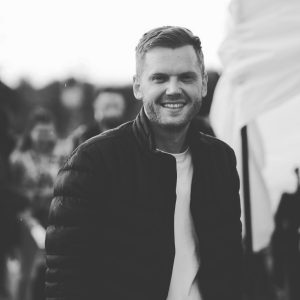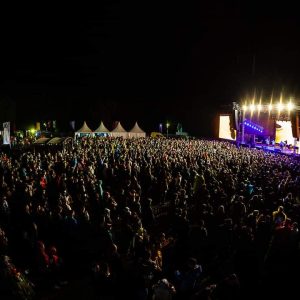:quality(80)/business-review.eu/wp-content/uploads/2023/08/analogue-15-august.jpg)
Set against the breathtaking backdrop of Platoul Făget, the Analogue Festival, now on its second edition, promises an unforgettable experience where music, art, and culture converge on the scene, which is going to take place this weekend, on August 25-27. Beyond entertainment, the festival aims to uplift local and regional communities by merging artistic expression with festival-goers. Business Review talked with Alin Calinescu, the festival’s director, and gives a sneak peek into the event’s heart and soul.
The event is organized by Mioveni Cultural Centre, and funding consists of roughly 80% sponsorships and 20% public funds. For this edition, the headliners are international artists – John Newman, Tinie Tempah, Selah Sue – as well as Romanian artists like B.U.G. Mafia, who will celebrate 30 years of activity in music on the Analogue stage, Delia, Subcarpați, Vița de vie, and others.
The first edition, held last year, was also organized on Făget Plateau and was a success, with over 30,000 participants. Făget Plateau is located 5 km from the center of Mioveni city (15 km from Pitești) and covers an area of 7.5 hectares. In addition to concerts, the festival will offer various leisure activities: hot air balloon rides, giant board games (Tic-Tac-Toe, Scrabble, Dominoes, Sorry!, Twister, Beer Pong, Ring Toss, etc.), face painting, balloon modeling, creative workshops, and more. Tickets are still available here.

Can you tell us about the inspiration behind starting the Analogue Festival? What drove you to create such an event?
As someone who’s been involved in organizing culture shows and music festivals for most of their professional life, I had been closely following the emerging music festival scene in Romania. We must remember that this isn’t something very old; Electric Castle started in 2013, Untold in 2015, Neversea in 2017. That’s barely ten years since Romania made it to Europe’s summer festival map.
The inspiration for Analogue came from Tomorrowland, one of the largest electronic music festivals in Europe, which over the years has evolved into something like its own world, with spin-offs in Brazil and in the French Alps. Tomorrowland is, as the name implies, sort of its own world, kind of like Disneyland. It’s also very laid-back and people-friendly.
I wanted to develop precisely this sort of laid-back festival that mixes music and experiences, and I knew the perfect spot a couple miles out from the town of Mioveni, where I work and live. It’s a roughly 7 ha area located among the rolling hills of the Faget plateau, nestled between tree groves and a local road. It is the ideal sort of location for a festival like ours, surrounded by untamed nature but within easy reach.
So, in short, this is how Analogue Festival came to be: as a response to a need for something where people can relax surrounded by nature, enjoy live music, socialize, and take part in a variety of experiences, from hot-air balloon rides to giant board games, creative workshops and so on. We have great and very diverse music, and much more on top of that, so the whole festival-going experience will be a lot richer than many others.
How did you come up with the name of the event?
Well, for all the good technology has brought us, one thing really went sideways: we’re now 24/7 plugged in. If people had been told 30 years ago that one day we’d barely be able to operate socially and professionally without a mobile phone, no one would’ve believed it. And yet here we are now, tethered to our phones every minute of every day.
So we named our festival Analogue as a sort of call to letting go and enjoy the festival-going experience – the nature, the walks among trees, the music, the games, and so on.
What challenges did you face when organizing the festival in Mioveni, a location that might not be commonly associated with art events? How did you overcome these challenges?
Having a festival in a place which is that large and readily accessible certainly helps. All new festivals (ours is just entering its sophomore year) face similar challenges. The first is viability. You can’t really afford to go in the red. That means ensuring your event has healthy financials, because expectations don’t usually match reality, especially at your first try. It’s quite easy to experience cost overruns, miss your sales target, or both. Keep in mind that we’re working with imponderables here – there are heavily publicized events that fizzle out and others that sell out. It’s really important, as a festival organizer, to have an insight into the current cultural and consumer trends. The people who are succesful in our business have a very good sense of where the culture is at the moment, so I try to keep up as well. So far, we’re in a good position financially.
The second challenge is survivability. This is a sort of business where past performance can actually drive current sales, so if you flub it one year, you may not get a second chance the next. A good lineup that draws crowds is just the start. You need to start building the festival brand before you even send out the first invitations to artists, and then stay laser-focused on the brand. If you blow it, there’s no going back.
The rest of it – the logistics, the permits, the marketing, safety and security – is just operations. Sure, some of these can be a real headache, but they’re essentially something you do following a plan. It’s the planning that counts above all else.

Could you share some highlights from previous edition of the Analogue Festival? What were some memorable performances that stood out?
Among last year’s headliners that were particularly well received by the audience were Asaf Avidan, B.U.G. Mafia (who are returning this year for their 30-year anniversary), Morcheeba, Subcarpați, and Zdob și Zdub.
Mioveni might not be as recognized as a destination for cultural events. How has the local community responded to the Analogue Festival? Have you noticed any positive impacts on the community? But nationwide?
Our town is much better known as the home of Dacia, perhaps the most beloved Romanian brand. It’s a small, pretty, charming and energetic place that’s just starting to get used being a summer draw for about 30,000 music fans, almost as many as the town’s entire population. People are welcoming, amused, and a bit puzzled by the attention their little town has been getting lately. But everyone is getting along fine. Also, Analogue Festival has brought in a very welcome new financial stream flowing into the local budget.
Could you talk about the collaborative aspect of the festival? Are there partnerships with local businesses, artists, or other institutions that contribute to its success?
Analogue Festival is organized by the Mioveni Cultural Center with the support of the Mayor and the town’s Local Council. We are proud to have the support of the following strong partners and sponsors: George, first intelligent banking, powered by BCR, Pepsi, Sigillum Moldaviae; Aldestar Top Transport, as well as Delta Invest, Ursus, Vectrum Solutions, Haulotte, Red Bull, CIPCOS Mar Complex, Aperol Spritz, Tanqueray, among others.
As the founder, what do you hope attendees take away from their experience at the Analogue Festival? What emotions or thoughts do you aim to evoke?
We hope our visitors will have the best time at the summer’s last major music festival, before returning to work or study. We would be really happy if people left with a sense of having been part of something unique, where they enjoyed music, made friends, spent time outdoors, chilled out, explored new places, tried new things, perhaps fell in love, and definitely decided to return next year.
The festival likely requires a lot of planning and coordination. How do you balance your vision for the event with the practicalities of execution? Are there any unexpected stories from the behind-the-scenes work?
As I said earlier, strong planning is the key. You need to be really strict where needed (ensuring fire safety, security and so on) and allow for flexibility when it comes to artist demands, concert logistics, partnerships etc.
As to unexpected things, we try to avoid them as much as possible, so I’m afraid there’s not much here. The mechanics of a festival are already much like controlled chaos, so we try to avoid complications if we can.

With a national agenda full of festivals with live music, how do you ensure the physical presence of the Analogue Festival remains appealing and relevant to audiences?
First, Analogue marks the end of the summer concert season, so it’s the last chance to stay in the summer mood. It is also different than all other music events in the country, because of its unique location – a 7.5 ha plot of land located in the huge expanse of the Făget park, among tree groves, crop lands, and private gardens. We give people the opportunity to experience new things, to relax, and enjoy music. We’ll have the unique opportunity to see B.U.G. Mafia in their 30-year anniversary concert. We have a stellar, diverse lineup. There will be hot-air balloon rides and great ethnic food. Need I say more?
Lastly, what advice would you give to aspiring event organizers or individuals who want to promote any forms of art in their own communities, based on your experience with the Analogue Festival?
Just start. Start by finding a concept, then plan, then execute – but start doing, don’t put it off for later. Once you get your hands in the work, I guarantee you’ll only be thinking about that magic first day when your event will open to the public. And lastly: try to stay in touch with the culture. People’s lives and choices are changing faster than ever. 6 months ago, you would read about AI in the science section. Now it’s making music and people are wondering what’s next. You need to see what’s coming before others do.



:quality(80)/business-review.eu/wp-content/uploads/2024/07/VGP-Park-Timisoara_-8thbuilding_iulie-24.jpg)



:quality(80)/business-review.eu/wp-content/uploads/2024/06/22C0420_006.jpg)

:quality(80)/business-review.eu/wp-content/uploads/2024/06/COVER-1-4.jpg)



:quality(80)/business-review.eu/wp-content/uploads/2024/06/br-june-2.jpg)
:quality(50)/business-review.eu/wp-content/uploads/2024/07/America-House-Offices-Bucharest-Fortim-Trusted-Advisors.jpg)
:quality(50)/business-review.eu/wp-content/uploads/2024/07/BeFunky-collage-33-scaled.jpg)
:quality(50)/business-review.eu/wp-content/uploads/2024/07/BeFunky-collage-32-scaled.jpg)